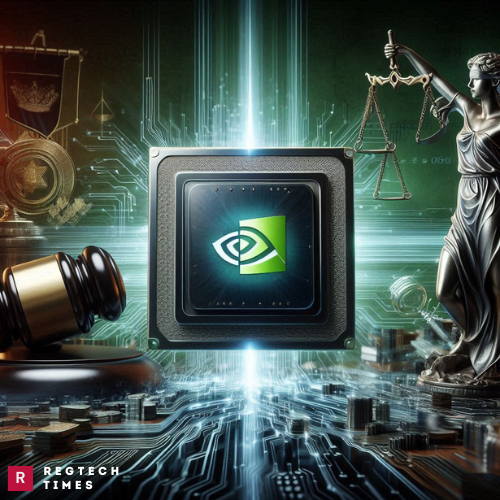NVIDIA Corp., a leading player in the artificial intelligence (AI) chip market, is now facing early-stage antitrust scrutiny from U.S. authorities over its market dominance. The investigation, led by the Department of Justice (DOJ) and the Federal Trade Commission (FTC), marks a significant shift in the regulatory landscape as the U.S. government intensifies its focus on the competitive dynamics of the rapidly growing AI sector.
The Beginning of the Probe
According to a recent report by The Wall Street Journal, the DOJ’s antitrust division has initiated an inquiry into NVIDIA’s contracts and partnerships to assess whether the company’s dominance in AI chips may be stifling competition. Although the investigation is in its early stages and no subpoenas have been issued, the DOJ could escalate its efforts and demand internal documents from NVIDIA if necessary.
The FTC is also investigating investments by major technology companies such as Microsoft, Amazon, and Alphabet (Google’s parent company) in AI startups. The FTC aims to determine whether these tech giants have gained unfair competitive advantages through their investment strategies, which could indirectly influence NVIDIA’s market positioning.
Why NVIDIA is Under Scrutiny
NVIDIA’s rapid growth in the AI sector has been meteoric. The company’s AI chips have become a cornerstone of the burgeoning AI ecosystem, powering everything from advanced machine learning algorithms to complex data processing tasks. Its dominance is evident: NVIDIA commands a significant market share, and its technology is considered best-in-class by many industry observers.
However, this commanding market position has attracted the attention of regulators not just in the U.S., but globally. Authorities in the European Union, the U.K., China, and South Korea have all expressed interest in NVIDIA’s practices, requesting information about its sales and partnerships to determine whether the company’s dominance might be detrimental to competition.
Google Antitrust Battle: Analyzing the Ad Tech Monopoly Claims
The U.S. probe is particularly notable, as it signifies a shift from the relatively hands-off approach that U.S. antitrust authorities have taken in recent years toward major tech firms like Google and Meta Platforms (formerly Facebook). This change comes as regulators increasingly focus on the impact of big tech on innovation and competition in key technological sectors like AI.
NVIDIA’s Defense: A Win on Merit?
NVIDIA has consistently defended its market position, arguing that its dominance is a result of the superior performance of its AI chips rather than any anti-competitive behavior. NVIDIA stated that it wins on merit, as reflected in its benchmark results and the value it provides to customers. It also emphasized that it does not require exclusivity from its customers, leaving them free to choose the best solutions for their needs.
Despite these reassurances, analysts have expressed concerns about NVIDIA’s market practices, particularly its reliance on a small number of customers. In its latest financial quarter, nearly half of NVIDIA’s $30 billion revenue was generated by just four customers, a level of concentration that some observers have called “highly unusual” and potentially a sign of limited market competition.
Market Reactions and Implications
The investigation comes at a critical time for NVIDIA. Last week, the company’s stock experienced a sharp 14% decline amid broader market concerns, although it has since shown signs of recovery. Despite the volatility, many investors and analysts remain bullish about NVIDIA’s long-term prospects. They cite its leadership in AI and gaming, sectors poised for significant growth, as key reasons for optimism.
However, the regulatory scrutiny could pose a challenge to NVIDIA’s future growth. If the DOJ and FTC find evidence of anti-competitive practices, NVIDIA could face substantial fines, restrictions, or even mandates to alter its business practices. Such actions could potentially impact its competitive positioning and ability to maintain its current growth trajectory in the AI market.
A Broader Regulatory Shift
The investigation into NVIDIA is part of a broader shift in how U.S. authorities are approaching antitrust issues in the tech industry. For years, companies like Google, Amazon, and Facebook faced limited regulatory resistance despite their growing dominance. Now, as AI and other emerging technologies become increasingly central to global economic growth, regulators are taking a more proactive stance.
The Underground Network of Nvidia Chips In China: A Power Struggle in the Tech War
This shift reflects growing concerns about the concentration of market power in the hands of a few tech giants. There is a heightened focus on ensuring that these companies do not stifle innovation or undermine competition, particularly in fields like AI, where rapid technological advancements have far-reaching implications for society.
Looking Ahead
While the outcome of the DOJ and FTC investigations remains uncertain, it is clear that NVIDIA will continue to face intense scrutiny from regulators worldwide. As AI technology continues to evolve and its importance to various sectors grows, NVIDIA’s market practices will remain under the microscope. How the company navigates this regulatory environment will be crucial to its future success and could set important precedents for the broader tech industry.
NVIDIA’s ability to sustain its growth and maintain its market leadership in AI will depend not just on its technological capabilities, but also on its ability to adapt to an increasingly complex and regulated global market landscape.
The unfolding investigation underscores the evolving nature of antitrust enforcement in the U.S., reflecting a new era where even the most innovative tech companies must be vigilant about compliance and market behavior.


